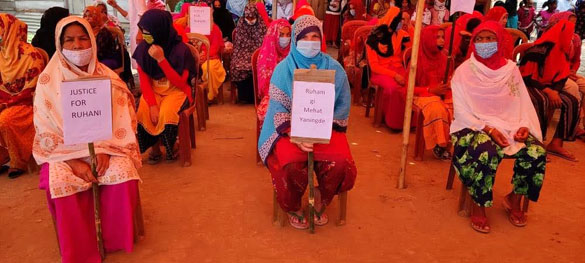
By Md. Chingiz Khan, New Age Islam
21 May 2021
Crimes Against Pangal Women, Including Those Of Sexual Assault And Rape Have Risen Many Folds In Recent Years
Main Points
1. Crimes against Pangal women, including those of sexual assault and rape have risen in recent years.
2. Many Muslims have argued that such will not happen if Muslims start to follow the ‘true’ Islamic precepts.
3. Pangal women need a movement of their own, which should singularly focus on gender rights and empowerment in order to fight against this injustice.
---

Muslims in Manipur are called Pangals. Crimes against Pangal women, including those of sexual assault and rape have risen many folds in recent years. This is alarming given the historical context of Manipur where such cases were very few in the past. What explains this rise in crimes against Muslim women? Should it be looked as a general trend across all communities or should we look for explanations which are intrinsic to the community?
The case of Manorama’s rape and murder in 2004 brought this problem in Manipur into greater focus. That the gruesome act was committed by an army personnel made the case into an advocacy for repealing AFSPA. But the sexual assault cases within the Pangal community have not received much attention till now. Partly this is also the result of the relative powerlessness of the Muslim community in Manipur wherein their voices are seldom heard as compared to more dominant communities such as the Meiteis.
In January 2020, a Pangal girl from Thoubal district was allegedly raped, brutally murdered and thrown into a roadside canal over some differences between the victim and the accused Sheikh Warish. Then, in August, another minor Muslim girl was raped while she went out for shopping. In the same month, another minor was raped by murdered and was found lying along a road. In this case, it seems that the girl eloped with the accused whose family refused to accept her. Along with his friends, the accused raped the girl who later died of excessive bleeding. While this case raised much consternation within the Muslim community, the cases did not stop. Shortly thereafter, a 19-year-old girl, who was pregnant, was raped and murdered and the accused in this case also is the partner of the girl, a Muslim man.
While it is heartening to note that in all these cases, arrests have been made and the process of law is ongoing, yet sadly there is no debate within the community over the issue. Mainly, such incidents are being treated as resulting from personal ‘differences’ or a product of jealousy. In many instances, the women themselves were blamed for bringing this upon themselves. The discussion within the Muslim community is that girls should not venture outside after certain hours and that too without male relatives. Many were of the opinion that if they were following the true Islamic precepts, then such things would never have occurred in the first place.
Clearly, these are inadequate explanations which are designed to limit the freedom of movement of Muslim girls. One such heinous crime was committed by a soon to be husband thus within the protected space of the household. Cases of sexual assault do not happen because women ‘venture out’ but can happen within intimate spaces from ones’ relatives against whom there is no protection. There needs to be open and frank discussion about such issues within the Manipuri Muslim society.
Hiding Behind The Solace Of Religion Is Not Going To Serve The Purpose
The root cause of the problem seems to be a lack of awareness and education as most of the areas where such incidents happened are extremely backward areas in terms of social indicators. Educationally, economically and socially, the Pangals are the most disadvantaged community in Manipur. It is also extremely patriarchal which restricts women’s freedom in strict sense of the term. The more worrying part is that such Muslims think that these restrictions are mandated by their religion. Moreover, there are lots of ‘token’ Muslim apologist intellectuals among the Pangals of Manipur. These are people who normally do not do anything to change the situation at the ground level. Such Muslims are present in many Pangal civil society organizations as advisors and convenors and consider themselves as ‘experts’ in every field of Manipuri Muslim society. They usually participate in important events of the Pangal society as leaders and have an all-knowing attitude. But clearly, the rises cases of crimes against Muslim makes it apparent that such experts are ill equipped to handle such a crisis.
Moreover, these intellectuals thrive on nepotism and partisanship. There is a need to get rid of such intellectuals who do precious but line their own pockets in the name of protecting the Muslim community. If the Muslim community has to compete with other communities in Manipur, then these intellectuals must be made marginal.
We also need a Muslim women specific initiative in Manipur to combat such crimes. Such a movement should be led by Muslim women and should forefront the issue of sexual crimes within the larger framework of gender justice and empowerment. It is surprising to note that despite Manipur having a rich and long tradition of women’s involvement in socio-economic and political causes, there has not been any gender-centric women’s movement. Specially for Muslim women, in a context where cases of sexual violence against them is on the rise, there is an urgent need for such a movement.
---
Md. Chingiz Khan is a doctoral student at the Centre for Historical Studies, Jawaharlal Nehru University.




 Moderate Islamist here
Moderate Islamist here


0 comments:
Post a Comment